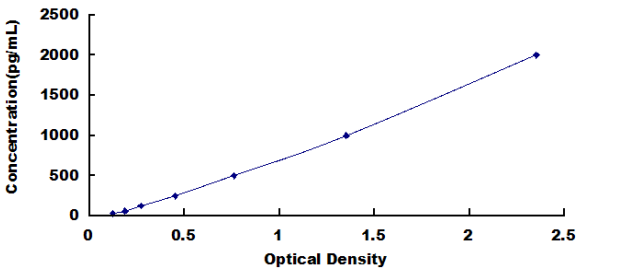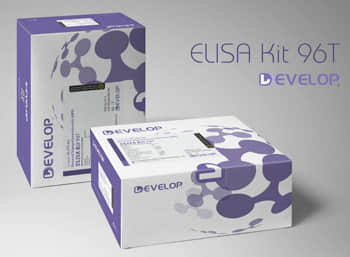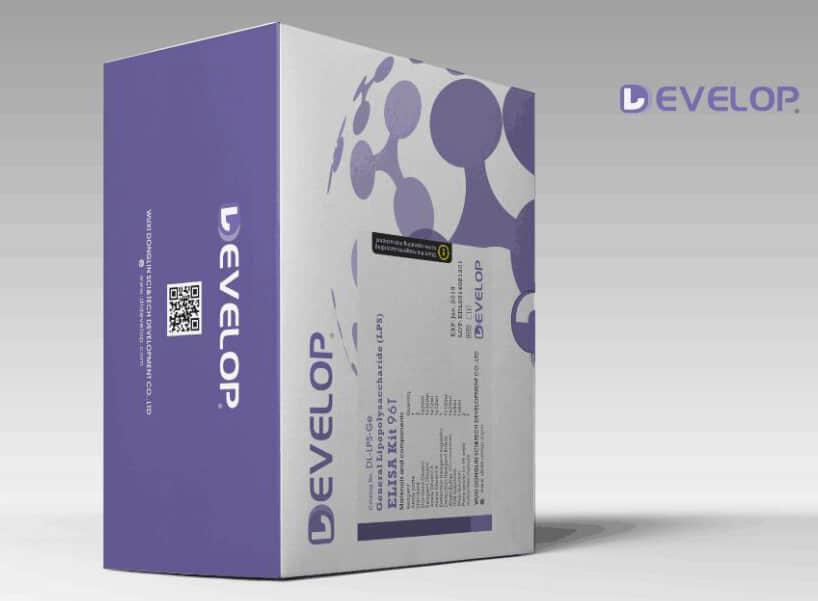Human Tenascin C (TNC) ELISA Kit


two product lines: Traditional ELISA Kit and Ready-to-Use ELISA Kit.


Other names:TN-C; HXB; TN; GMEM; JI; Myotendinous antigen; Neuronectin; GP 150-225; Cytotactin; Hexabrachion; Glioma-associated-extracellular matrix antigen
Function: Extracellular matrix protein implicated in guidance of migrating neurons as well as axons during development, synaptic plasticity as well as neuronal regeneration. Promotes neurite outgrowth from cortical neurons grown on a monolayer of astrocytes. Ligand for integrins alpha-8/beta-1, alpha-9/beta-1, alpha-V/beta-3 and alpha-V/beta-6.
Sequence:
10 20 30 40 50 MGAMTQLLAG VFLAFLALAT EGGVLKKVIR HKRQSGVNAT LPEENQPVVF 60 70 80 90 100 NHVYNIKLPV GSQCSVDLES ASGEKDLAPP SEPSESFQEH TVDGENQIVF 110 120 130 140 150 THRINIPRRA CGCAAAPDVK ELLSRLEELE NLVSSLREQC TAGAGCCLQP 160 170 180 190 200 ATGRLDTRPF CSGRGNFSTE GCGCVCEPGW KGPNCSEPEC PGNCHLRGRC 210 220 230 240 250 IDGQCICDDG FTGEDCSQLA CPSDCNDQGK CVNGVCICFE GYAGADCSRE 260 270 280 290 300 ICPVPCSEEH GTCVDGLCVC HDGFAGDDCN KPLCLNNCYN RGRCVENECV 310 320 330 340 350 CDEGFTGEDC SELICPNDCF DRGRCINGTC YCEEGFTGED CGKPTCPHAC 360 370 380 390 400 HTQGRCEEGQ CVCDEGFAGV DCSEKRCPAD CHNRGRCVDG RCECDDGFTG 410 420 430 440 450 ADCGELKCPN GCSGHGRCVN GQCVCDEGYT GEDCSQLRCP NDCHSRGRCV 460 470 480 490 500 EGKCVCEQGF KGYDCSDMSC PNDCHQHGRC VNGMCVCDDG YTGEDCRDRQ 510 520 530 540 550 CPRDCSNRGL CVDGQCVCED GFTGPDCAEL SCPNDCHGQG RCVNGQCVCH 560 570 580 590 600 EGFMGKDCKE QRCPSDCHGQ GRCVDGQCIC HEGFTGLDCG QHSCPSDCNN 610 620 630 640 650 LGQCVSGRCI CNEGYSGEDC SEVSPPKDLV VTEVTEETVN LAWDNEMRVT 660 670 680 690 700 EYLVVYTPTH EGGLEMQFRV PGDQTSTIIQ ELEPGVEYFI RVFAILENKK 710 720 730 740 750 SIPVSARVAT YLPAPEGLKF KSIKETSVEV EWDPLDIAFE TWEIIFRNMN 760 770 780 790 800 KEDEGEITKS LRRPETSYRQ TGLAPGQEYE ISLHIVKNNT RGPGLKRVTT 810 820 830 840 850 TRLDAPSQIE VKDVTDTTAL ITWFKPLAEI DGIELTYGIK DVPGDRTTID 860 870 880 890 900 LTEDENQYSI GNLKPDTEYE VSLISRRGDM SSNPAKETFT TGLDAPRNLR 910 920 930 940 950 RVSQTDNSIT LEWRNGKAAI DSYRIKYAPI SGGDHAEVDV PKSQQATTKT 960 970 980 990 1000 TLTGLRPGTE YGIGVSAVKE DKESNPATIN AATELDTPKD LQVSETAETS 1010 1020 1030 1040 1050 LTLLWKTPLA KFDRYRLNYS LPTGQWVGVQ LPRNTTSYVL RGLEPGQEYN 1060 1070 1080 1090 1100 VLLTAEKGRH KSKPARVKAS TEQAPELENL TVTEVGWDGL RLNWTAADQA 1110 1120 1130 1140 1150 YEHFIIQVQE ANKVEAARNL TVPGSLRAVD IPGLKAATPY TVSIYGVIQG 1160 1170 1180 1190 1200 YRTPVLSAEA STGETPNLGE VVVAEVGWDA LKLNWTAPEG AYEYFFIQVQ 1210 1220 1230 1240 1250 EADTVEAAQN LTVPGGLRST DLPGLKAATH YTITIRGVTQ DFSTTPLSVE 1260 1270 1280 1290 1300 VLTEEVPDMG NLTVTEVSWD ALRLNWTTPD GTYDQFTIQV QEADQVEEAH 1310 1320 1330 1340 1350 NLTVPGSLRS MEIPGLRAGT PYTVTLHGEV RGHSTRPLAV EVVTEDLPQL 1360 1370 1380 1390 1400 GDLAVSEVGW DGLRLNWTAA DNAYEHFVIQ VQEVNKVEAA QNLTLPGSLR 1410 1420 1430 1440 1450 AVDIPGLEAA TPYRVSIYGV IRGYRTPVLS AEASTAKEPE IGNLNVSDIT 1460 1470 1480 1490 1500 PESFNLSWMA TDGIFETFTI EIIDSNRLLE TVEYNISGAE RTAHISGLPP 1510 1520 1530 1540 1550 STDFIVYLSG LAPSIRTKTI SATATTEALP LLENLTISDI NPYGFTVSWM 1560 1570 1580 1590 1600 ASENAFDSFL VTVVDSGKLL DPQEFTLSGT QRKLELRGLI TGIGYEVMVS 1610 1620 1630 1640 1650 GFTQGHQTKP LRAEIVTEAE PEVDNLLVSD ATPDGFRLSW TADEGVFDNF 1660 1670 1680 1690 1700 VLKIRDTKKQ SEPLEITLLA PERTRDITGL REATEYEIEL YGISKGRRSQ 1710 1720 1730 1740 1750 TVSAIATTAM GSPKEVIFSD ITENSATVSW RAPTAQVESF RITYVPITGG 1760 1770 1780 1790 1800 TPSMVTVDGT KTQTRLVKLI PGVEYLVSII AMKGFEESEP VSGSFTTALD 1810 1820 1830 1840 1850 GPSGLVTANI TDSEALARWQ PAIATVDSYV ISYTGEKVPE ITRTVSGNTV 1860 1870 1880 1890 1900 EYALTDLEPA TEYTLRIFAE KGPQKSSTIT AKFTTDLDSP RDLTATEVQS 1910 1920 1930 1940 1950 ETALLTWRPP RASVTGYLLV YESVDGTVKE VIVGPDTTSY SLADLSPSTH 1960 1970 1980 1990 2000 YTAKIQALNG PLRSNMIQTI FTTIGLLYPF PKDCSQAMLN GDTTSGLYTI 2010 2020 2030 2040 2050 YLNGDKAEAL EVFCDMTSDG GGWIVFLRRK NGRENFYQNW KAYAAGFGDR 2060 2070 2080 2090 2100 REEFWLGLDN LNKITAQGQY ELRVDLRDHG ETAFAVYDKF SVGDAKTRYK 2110 2120 2130 2140 2150 LKVEGYSGTA GDSMAYHNGR SFSTFDKDTD SAITNCALSY KGAFWYRNCH 2160 2170 2180 2190 2200 RVNLMGRYGD NNHSQGVNWF HWKGHEHSIQ FAEMKLRPSN FRNLEGRRKR A
INTENDED USE
The kit is a sandwich enzyme immunoassay for the in vitro quantitative measurement of TNC in human serum, plasma, tissue homogenates or other biological fluids.
DETECTION RANGE
31.25-2000pg/mL. The standard curve concentrations used for the ELISA’s were 2000pg/mL, 1000pg/mL, 500pg/mL, 250pg/mL, 125pg/mL, 62.5pg/mL, 31.2pg/mL.
SENSITIVITY
The minimum detectable dose of TNC is typically less than 14.2pg/mL.
The sensitivity of this assay, or Lower Limit of Detection (LLD) was defined as the lowest protein concentration that could be differentiated from zero. It was determined by adding two standard deviations to the mean optical density value of twenty zero standard replicates and calculating the corresponding concentration.
SPECIFICITY
This assay has high sensitivity and excellent specificity for detection of TNC.
No significant cross-reactivity or interference between TNC and analogues was observed.
You can reference link of the kit as following
| https://dldevelop.com/Research-reagent/dl-tnc-hu.html |
| https://dldevelop.com/Research-reagent/dl-tnc-ra.html |
Introduction
| Item | Standard | Test | |
| Description |
The kit is a sandwich enzyme immunoassay for the in vitro quantitative measurement of TNC in human serum, plasma, tissue homogenates and other biological fluids. |
Conform | |
| Identification | Colorimetric | Positive | |
| Composition | Traditional ELISA Kit | Ready-to-Use ELISA KIT | Conform |
| Pre-coated, ready to use 96-well strip plate 1 | Pre-coated, ready to use 96-well strip plate 1 | ||
| Plate sealer for 96 wells 2 | Plate sealer for 96 wells 2 | ||
| Standard 2 | Standard 2 | ||
| Diluents buffer 1×45mL | Standard Diluent 1×20mL | ||
| Detection Reagent A 1×120μL | Detection Solution A 1×12mL | ||
| Detection Reagent B 1×120μL | Detection Solution B 1×12mL | ||
| TMB Substrate 1×9mL | TMB Substrate 1×9mL | ||
| Stop Solution 1×6mL | Stop Solution 1×6mL | ||
| Wash Buffer (30 × concentrate) 1×20mL | Wash Buffer (30 × concentrate) 1×20mL | ||
| Instruction manual 1 | Instruction manual 1 | ||
Test principle
The microtiter plate provided in this kit has been pre-coated with an antibody specific to the index. Standards or samples are then added to the appropriate microtiter plate wells with a biotin-conjugated antibody preparation specific to the index. Next, Avidin conjugated to Horseradish Peroxidase (HRP) is added to each microplate well and incubated. After TMB substrate solution is added, only those wells that contain the index, biotin-conjugated antibody and enzyme-conjugated Avidin will exhibit a change in color. The enzyme-substrate reaction is terminated by the addition of sulphuric acid solution and the color change is measured spectrophotometrically at a wavelength of 450nm ± 10nm. The concentration of the index in the samples is then determined by comparing the O.D. of the samples to the standard curve.
Recovery
Matrices listed below were spiked with certain level of recombinant TNC and the recovery rates were calculated by comparing the measured value to the expected amount of the index in samples.
| Matrix | Recovery range (%) | Average(%) |
| serum(n=5) | 81-93 | 86 |
| EDTA plasma(n=5) | 80-97 | 88 |
| heparin plasma(n=5) | 90-101 | 95 |
Linearity
The linearity of the kit was assayed by testing samples spiked with appropriate concentration of the index and their serial dilutions. The results were demonstrated by the percentage of calculated concentration to the expected.
| Sample | 1:2 | 1:4 | 1:8 | 1:16 |
| serum(n=5) | 82-96% | 83-98% | 81-99% | 93-101% |
| EDTA plasma(n=5) | 88-101% | 86-95% | 90-102% | 80-93% |
| heparin plasma(n=5) | 80-91% | 82-90% | 95-104% | 79-95% |
Precision
Intra-assay Precision (Precision within an assay): 3 samples with low, middle and high level the index were tested 20 times on one plate, respectively.
Inter-assay Precision (Precision between assays): 3 samples with low, middle and high level the index were tested on 3 different plates, 8 replicates in each plate.
CV(%) = SD/meanX100
Intra-Assay: CV<10%
Inter-Assay: CV<12%
Stability
The stability of ELISA kit is determined by the loss rate of activity. The loss rate of this kit is less than 5% within the expiration date under appropriate storage conditions.
Note:
To minimize unnecessary influences on the performance, operation procedures and lab conditions, especially room temperature, air humidity and incubator temperatures should be strictly regulated. It is also strongly suggested that the whole assay is performed by the same experimenter from the beginning to the end.
Assay procedure summary
1. Prepare all reagents, samples and standards;
2. Add 100µL standard or sample to each well. Incubate 2 hours at 37℃;
3. Aspirate and add 100µL prepared Detection Reagent A. Incubate 1 hour at 37℃;
4. Aspirate and wash 3 times;
5. Add 100µL prepared Detection Reagent B. Incubate 1 hour at 37℃;
6. Aspirate and wash 5 times;
7. Add 90µL Substrate Solution. Incubate 15-25 minutes at 37℃;
8. Add 50µL Stop Solution. Read at 450nm immediately.
Order or get a Quote
We will reply you within 24 hours!














